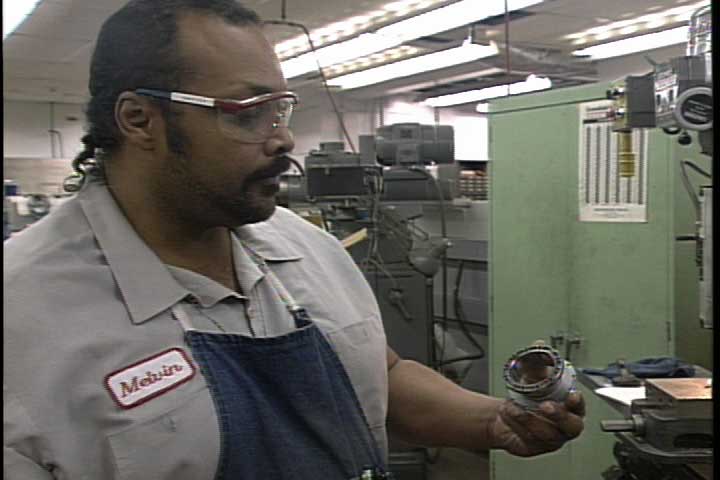No, no, no, no, no. 58,000 times, no. Because we haven’t made fun of enough of these undifferentiated debt bloggers yet. So here’s another one! Lindsey Thurston at Cents & Sensibility. These vermin are so indistinguishable, so repetitive, so devoid of originality that they think they’ve uncovered new strata of cleverness every time they fashion a pun on “cents” and its homonym “sense”. The sad(der) part is that the logo on Ms. Thurston’s site doesn’t even spell its own name correctly. It uses the wrong homonym: “Sense and Sensibility”, just like the original (unreadable) Jane Austen novel. She also used the same image from the Lauren Graham movie Bad Santa that we did a few months back. Sister, if someone’s going to violate copyright law around here, it’ll be us, OK? Besides, you clearly stole this line in your bio from every other Financial Retard of the Month we’ve already objurgated over the years:
I graduated with a Bachelor of Arts (in Psychology) and a monstrous $45,000 student loan.
Do you people realize how tiresome this gets, this general first-person declaration that you borrowed far more money than you could afford (to achieve an empty goal, no less) and now think that your broke posterior is qualified to write a single word about money? (Other than “Keep me away from it, before I burn my fingers with it again”?) It’s the same 1-chord song, but only the singer changes. We’d now link to every Lindsey Thurston clone who’s already brought similar steaming plates of rotten lutefisk to our attention, but there are literally dozens of them and it’d take forever.
Blue-collar champion and master of the practical Mike Rowe recently summarized the state of self-destructive higher theoretic education and the accompanying student loan industry, stating “We are lending money we don’t have to kids who can’t pay it back to train them for jobs that no longer exist.” Or in the case of what one can do with a B.A. in psychology, jobs that never existed. As always with these people, it gets better.
Lindsey got knocked up at 19. (Fat girls really are more fun!) She and the father went their separate ways, and if there’s a worse preparation for adulthood than being a single teenage mom and then proceeding to incur $45,000 in debt while attending college for a useless degree, we don’t know what it might be.
That’s only the start. Lindsey graduated in 7 years, which we’re guessing wasn’t due to a Mormon mission and a medical redshirt. She then met a guy who thought that hitching his wagon to a single mom with a 7-year old kid and a Lake Baikal of red ink would be a prudent decision. You’re not going to believe this, but their fairytale romance didn’t work out. 2 years later they split, and she returned home with…well, when it comes to these pathos research projects it’s best to quote the original sources:
I ended up getting the job (but with low pay) back in my hometown and went about trying to start over. I never seemed to have enough to make ends meet though. I was working three jobs at one point trying to “catch up”.
But how can that be possible, given that she had an invaluable university (not “college”, she’s Canadian) degree? Nothing’s more important than an education, so how did that impressive psychology B.A. not attract hundreds of employers with lucrative job offers? Especially since she spent so much time crafting it?
This gets weirder. Ms. Thurston continually refers to her blog as “Sense & Sensibility.” The only reference to “Cents & Sensibility” seems to be in the URL. She can’t even do rehashed puns right. Nor has she figured out the one homonym that mastery of should be a prerequisite for attending the 2nd grade:
I made too much too (sic) qualify for “interest relief” on my student loans and other social programs and too little to make ends meet.
So by all means, create a personal finance website then. We learn that Ms. Thurston is currently $35,000 in debt, but that’s totally cool because she used to be $67,000 in debt. You see, this stuff is all relative. And if we were to point out that the Control Your Cash principals are several multiples beyond that, but in the other direction, then that would just mean that we’re ostentatious and insecure blowhards who love rubbing our good fortune in poor people’s faces.
(Actually, it would mean that we refrained from making calamitous decisions such as reproducing far too early and handing stacks of third-party cash over to a university, but most people don’t like to hear the truth.)
We’re skeptical of the $35,000 figure, too. If the graphics on her site are any indication, and are calibrated arithmetically and not logarithmically, it’d seem that she’s more like $53,000 in debt. She has two bars on the right column of her main page, one showing that she’s paid off half a $50,000 debt and the other showing that she’s paid off maybe 1/20 of a $29,000 debt. She gave these bars the precious names “Makin’ A Dent-O-Meter” and “Kickin’ Ass-O-Meter”, and would it kill these net drains on society to act like adults and take this stuff seriously? Then again, why should they when there’s endless reinforcement in the comments? One commenter wrote “Hey 32k is a lot!!! Great job!” Taking that on its own merits, 35k is an even bigger lot. (!!!)
Imagine if there existed a personal finance blogger who created a “Kickin’ Ass-O-Meter” to quantify her augmenting positive net worth. Her monthly cash flow rose $2000 last month, her net worth $16,000, and the Kickin’ Ass-O-Meter documented the increases. Most people would regard that as unseemly, a crass display of one’s materialistic bent and the kind of thing better kept private.
Then how the hell is it any different when you’re trying to reach zero instead of some other number? Ms. Thurston ought to keep this to herself, but this is 2013. Accruing consumer debt is no longer something embarrassing, but rather something to be proud of as it cements one’s position as a victim yearning to break free – a Strong Woman Who Shall Overcome Whatever Life Can Throw At Her, even if what life’s throwing at her is a 16-lb. shot put and she’s the one who hoisted it in the first place.
Ms. Thurston even admits that she was inspired to create her blog after discovering one called, ahem, “Making Cents of Sense.” You see what the author did there? Here, we’ll walk you through it one more time. She noticed that “cents” and “sense” sound identical (though they’re spelled differently), and considered it dexterous wordplay to bring that coincidence to her readers’ attention.
Our favorite part was when Ms. Thurston offered financial advice to her kid, now 16. The easy joke to make here would be that the advice was “Do everything I didn’t do,” but that’s exactly what it is.
[S]he doesn’t understand the value of money in any real sense. She connects the two facts that there are things she wants and that they cost money but that’s about it for insight. The idea that she has to earn money before she can spend it seems to be the missing link in her brain.
That’s a blockquote. Which means it’s Ms. Thurston referring to her kid, not us referring to Ms. Thurston.
Jesus H. Of course she splurged on a wedding.* Of course she’s going back to college for another bachelor’s degree, because 7 years in university just weren’t enough. And of course she’s made a list of goals (people who never accomplish anything love to list goals), one of which is…that she promises to spend 45 minutes a day entering contests. Because you never know what you might win. What she’d win from spending 45 minutes a day on a StairClimber is more certain, more beneficial, and more tangible. But it’s also less fanciful, and considerably more difficult, so we can discard it immediately.
If you take one thing away from our site, let it be this: By and large, people want to be poor. They make the decisions and willingly execute the activities that will invariably result in being poor, therefore it stands to reason that they must want to be poor. Nothing will convince them otherwise, as they happily continue with the same destructive habits (spending too much, overeducating, writing interminable self-referential blog posts) that got them poor in the first place.
The good news is that thanks to them, the field is a lot less crowded for the rest of us. Don’t crank out kids when you’re a teenager, don’t spend money you can’t afford, don’t borrow money to exacerbate the problem of spending money you can’t afford, and stop selling assets and buying liabilities. Read this and you’ll never be anyone’s retard.
*If you’re $35,000 in debt, and you do anything beyond paying $50 to have a justice of the peace marry you, you’re splurging.





